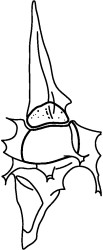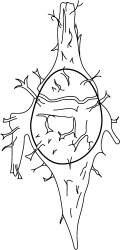Difference between revisions of "Xenascus ceratioides"
| Line 13: | Line 13: | ||
|?Category:Type#<nowiki>*</nowiki>, | |?Category:Type#<nowiki>*</nowiki>, | ||
|?Category:TypeCorrectName#<nowiki>+</nowiki>, | |?Category:TypeCorrectName#<nowiki>+</nowiki>, | ||
| − | |limit= | + | |limit=400 |
|format=template | template=SpeciesListNoQuest | |format=template | template=SpeciesListNoQuest | ||
|?Category:Quoted#",''' | |?Category:Quoted#",''' | ||
|Outro=</div>}} | |Outro=</div>}} | ||
Revision as of 16:28, 4 December 2016
ceratioides (Deflandre, 1937b, p.66-67, pl.12 [al. pl.9], figs.7-8) Lentin and Williams, 1973, p.144. Holotype: Deflandre, 1937b, pl.12 (al. pl.9), figs.7-8; Fensome et al., 1991, fig.1 - p.601; fig.1 - p.605. Originally Hystrichosphaera, subsequently Pseudoceratium, thirdly Spiniferites, fourthly Phoberocysta, fifthly (and now) Xenascus. Taxonomic junior synonyms: Endoceratium (now Xenascus) perforatum, according to Davey and Verdier (1971, p.27) - however, Yun Hyesu (1981, p.62) retained Endoceratium (as Xenascus) perforatum; Xenascus australensis, according to Davey and Verdier (1971, p.26) - however, Lentin and Williams (1985, p.374) retained Xenascus australensis; Odontochitina blastema, according to Davey and Verdier (1971, p.27) - however, Stover and Helby (1987a, p.128) retained Odontochitina (as Xenascus) blastema. Age: Senonian.


Infrataxon List: